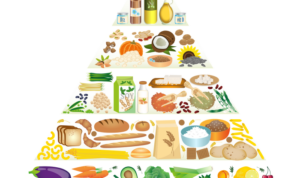Balanced Diet Tips sets the stage for this enthralling narrative, offering readers a glimpse into a story that is rich in detail with american high school hip style and brimming with originality from the outset.
When it comes to maintaining optimal health and well-being, a balanced diet is the cornerstone of success. From preventing diseases to promoting longevity, the importance of a well-rounded approach to nutrition cannot be understated. Let’s dive into the world of Balanced Diet Tips and uncover the secrets to a healthier lifestyle.
Importance of a Balanced Diet

Eating a balanced diet is like giving your body the VIP treatment it deserves. It’s not just about looking good on the outside; it’s about feeling amazing on the inside too. Let’s dive into why a balanced diet is key to rocking your health game.
Preventing Diseases and Promoting Longevity
A balanced diet is your shield against the sneak attacks of diseases and illnesses. By fueling your body with the right mix of nutrients, vitamins, and minerals, you’re boosting your immune system and lowering the risk of chronic conditions like heart disease, diabetes, and even some cancers. It’s like a superhero cape for your health!
- Include plenty of colorful fruits and veggies in your diet to get a rainbow of nutrients that fight off those pesky free radicals.
- Don’t forget the protein powerhouses like lean meats, fish, tofu, and beans to keep your muscles strong and your energy levels high.
- Healthy fats like avocados, nuts, and olive oil are your friends for a happy heart and a sharp brain.
- Whole grains like quinoa, brown rice, and oats are the MVPs of fiber, keeping your digestion smooth and your cholesterol in check.
Achieving a Balanced Diet for Different Age Groups
It’s like customizing your playlist for different vibes – your body needs different things at different stages of life. Here’s a quick cheat sheet to help you dial in your balanced diet game:
- Teen Titans: Load up on calcium-rich foods like dairy, leafy greens, and fortified cereals to build strong bones and teeth for the long haul.
- Adulting Avengers: Keep that metabolism fired up with a mix of lean proteins, whole grains, and plenty of veggies. Don’t forget to hydrate like it’s your job!
- Golden Oldies: Focus on foods rich in antioxidants like berries, nuts, and seeds to protect your cells from the wear and tear of time. And don’t skimp on the omega-3 fatty acids for a sharp mind and a happy heart.
Nutrient-Rich Foods to Include: Balanced Diet Tips
Incorporating essential nutrients into your diet is crucial for overall health and well-being. Nutrient-rich foods like fruits, vegetables, whole grains, lean proteins, and healthy fats provide a wide range of benefits that can help you feel your best.
Fruits and Vegetables
Eating a variety of colorful fruits and vegetables can provide essential vitamins, minerals, and antioxidants that support immune function, promote healthy digestion, and reduce the risk of chronic diseases. Aim to fill half your plate with fruits and vegetables at each meal to ensure you’re getting a good mix of nutrients.
Whole Grains
Whole grains like brown rice, quinoa, oats, and whole wheat bread are rich in fiber, vitamins, and minerals. They can help regulate blood sugar levels, improve digestion, and keep you feeling full and satisfied. Swap out refined grains for whole grains to increase the nutrient density of your meals.
Lean Proteins
Including lean proteins such as chicken, turkey, fish, tofu, and legumes in your diet is essential for muscle repair, growth, and overall health. These foods are also rich in important nutrients like iron, zinc, and B vitamins. Opt for grilled, baked, or steamed protein sources to keep meals healthy and nutritious.
Healthy Fats
Healthy fats from sources like avocados, nuts, seeds, and olive oil are important for brain function, hormone production, and nutrient absorption. While fats are calorie-dense, they are an essential part of a balanced diet. Incorporate small amounts of healthy fats into your meals to support overall health and well-being.
Portion Control and Moderation
When it comes to maintaining a balanced diet, portion control and moderation are key. Pay attention to serving sizes, listen to your body’s hunger and fullness cues, and enjoy treats in moderation. By practicing portion control, you can enjoy a wide variety of foods while still meeting your nutritional needs.
Meal Planning and Preparation
Planning and preparing meals in advance is crucial for maintaining a balanced diet and healthy lifestyle. By taking the time to plan out your meals, you can ensure that you are getting all the necessary nutrients your body needs to function optimally. Additionally, meal prepping can save you time and make healthy eating more convenient.
Portion Sizes and Mindful Eating, Balanced Diet Tips
- Avoid oversized portions by using smaller plates or containers to help control portion sizes.
- Listen to your body’s hunger cues and stop eating when you feel satisfied, rather than when your plate is empty.
- Chew your food slowly and savor each bite to help improve digestion and prevent overeating.
- Avoid distractions while eating, such as watching TV or scrolling through your phone, to focus on your meal and prevent mindless eating.
Meal Prepping Strategies
- Choose one day a week to plan and prep your meals for the upcoming days to save time and ensure you have healthy options readily available.
- Prepare ingredients in bulk, such as chopping vegetables or cooking grains, to make assembling meals quick and easy throughout the week.
- Invest in quality storage containers to store prepped meals and snacks, making it easy to grab and go when you’re on the move.
Benefits of Home-Cooked Meals
- Home-cooked meals are typically healthier than restaurant or fast food options, as you have control over the ingredients and cooking methods used.
- Cooking at home allows you to experiment with different flavors and ingredients, making meals more enjoyable and satisfying.
- You can save money by cooking at home and avoiding the high costs associated with eating out regularly.
- Home-cooked meals promote family bonding and can be a fun activity to do together with loved ones.
Hydration and Dietary Habits

Maintaining adequate hydration is crucial for a balanced diet as water plays a vital role in various bodily functions. It helps regulate body temperature, aids in digestion, and flushes out toxins. Dehydration can lead to fatigue, headaches, and even impaired cognitive function.
Impact of Sugary Beverages and Processed Foods
Consuming sugary beverages and processed foods can have a detrimental effect on overall health. These items are often high in empty calories, added sugars, and unhealthy fats, contributing to weight gain, increased risk of chronic diseases like diabetes and heart disease, and even dental issues. It’s important to limit the intake of these items in a balanced diet.
Making Healthier Beverage Choices
- Aim to drink plenty of water throughout the day to stay hydrated without added sugars or calories.
- Opt for unsweetened beverages like herbal teas, infused water, or sparkling water with a splash of fruit juice for flavor.
- Limit consumption of sugary drinks like soda, fruit juices, energy drinks, and sweetened coffee beverages.
- Consider alternatives like unsweetened almond milk, coconut water, or homemade smoothies with fresh fruits and vegetables.
Developing Healthy Eating Habits
- Eat a variety of nutrient-rich foods from all food groups to ensure you’re getting essential vitamins and minerals.
- Practice mindful eating by listening to your body’s hunger and fullness cues to avoid overeating.
- Plan and prepare meals ahead of time to avoid reaching for unhealthy convenience foods when hunger strikes.
- Aim for balance and moderation in your diet, enjoying treats in moderation while focusing on nourishing your body with whole, unprocessed foods.

